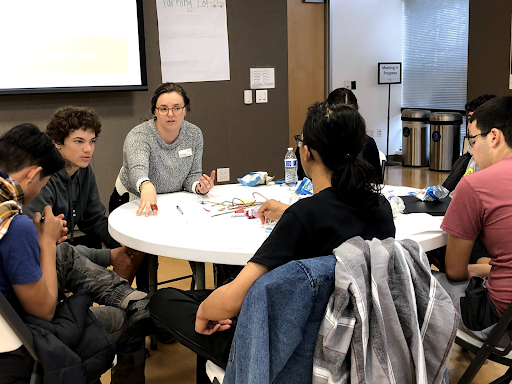3 Social Innovation Lessons Shaping My Approach to Life and Work
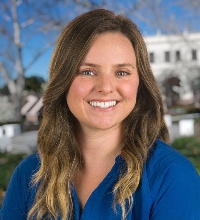
The following post was contributed by Master’s in Social Innovation student Daria Tomsky.
For the last year I have been studying to earn a Master’s in Social Innovation degree. Each time I share this with others, there is an awkward pause, followed by the question, “What is that?”
Social Innovation, as I have come to define it, is understanding unmet social needs, to develop creative solutions that are more effective, more efficient, more sustainable, or more just than what currently exists. These solutions don’t necessarily need to be new, but they must improve what they set out to improve for the people in need of the improvement. The definition is by no means set in stone, and will change depending on who you ask.
In learning about the theory and definitions of Social Innovation, I asked myself how there is a program that seeks to develop Master’s of Social Innovation students when we can’t agreeably define Social Innovation? I have since come to realize that the definition is not what’s important. Becoming a Master of Social Innovation requires a life-long commitment to practicing, not mastering, a specific skill set. Mastery is not possible, nor is it the goal.
The three lessons I explain below are life-long processes and guidelines for interaction and understanding of oneself and the world. These lessons are essential now, more than ever, as our world grapples with major fundamental crises of health, racial and economic justice, sexual and religious freedom, climate change and basic human rights. I have begun applying these lessons in my life, and in my work at Jewish Family Service (JFS) of San Diego with the youth in our Teen Leadership Program. Although I will never fully master the skills, I commit to them personally, and to sharing them with others in hopes of creating a more just world.
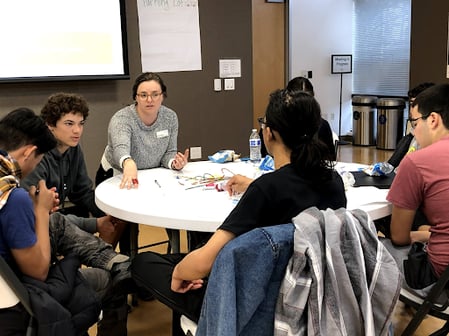
Lesson 1: Challenge Assumptions and Check Your Biases
In order to begin chipping away at age-old systems that have led to the myriad of social issues we are faced with, one must ask why things are the way they are – and then ask why again, and again. As soon as you think you may know the answer, once again ask why.
As I learned in Professor Choi-Fitzpatrick’s Social Innovation class, getting to the root of a problem is an essential first step in creating change. Part of this process lies in asking questions of, and working with, those who are most impacted by an issue. One must also dive inward to understand how their identity and place in existing social systems dictates what they think and how they might articulate solutions.
In my work at JFS, I attempted to bring this practice to the youth I worked with in our Teen Leadership Program. I shared with them models for questioning and challenging assumptions to encourage them to think more deeply about an issue. Before developing their own group projects, they participated in a series of activities to question what they believed to be an issue, why they thought that way, and how they could know more – before collaboratively brainstorming solutions. Breaking through siloed patterns of thinking to understand that your experience will be vastly different than the person next to you is a fundamental step towards progress as it encourages empathy and understanding.
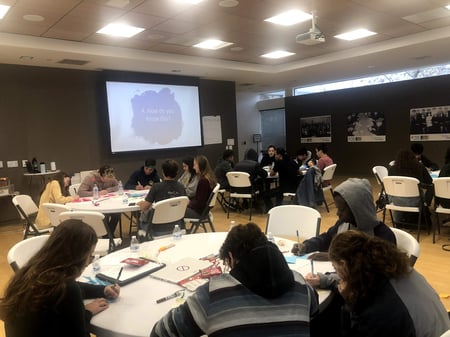 Lesson 2: Listen, Watch and Absorb
Lesson 2: Listen, Watch and Absorb
I have always been creative and a problem solver. When an issue presents itself, I want to fix it, and I will rattle off idea after idea. I have learned over time that those skills alone will get me nowhere fast.
Deeply listening is hard for me and something I am continuously working on. A critical step to being an effective changemaker, as I learned in Dean Márquez’s Effective Changemaker workshop, is taking the time to talk with and observe others and our surroundings. Oftentimes the work we set out to do has been attempted before. In other situations, vulnerable communities will be identified as in need of our help without being consulted on what they feel they really need. In taking time to listen, watch, and absorb the information already there, we can better understand how to move forward with the communities impacted in mind, and included in the process.
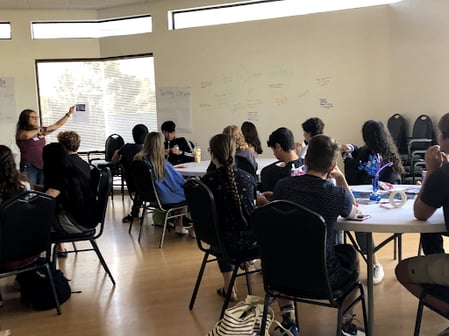
Lesson 3: Normalize Failure
Nothing will be done right the first time around. It is within failure where we can sometimes find the most growth. Learning from one’s mistakes is much easier said than done, yet it is such an important part of becoming resilient. As social innovators, we seek to challenge systems that don’t work, to identify problems that have existed for far too long, and to develop solutions collaboratively for real and lasting change.
I have learned in my first year of the Master’s in Social Innovation program that breaking the barriers that have perpetuated unjust systems takes guts. You will be forced to ask hard questions and forced to try something new without a guarantee of its success. That can be a scary place and will likely lead to failure – but that is a good thing. When things don’t go the way we imagine, we are able to find room for improvement – and it is for that reason I argue that social innovation does not need to be new, but it must be an improvement from what we’ve already seen and tried.
I want to conclude by reiterating this important point: Becoming a social innovator is not about being a master. It is about adopting an ever-evolving framework for looking at yourself, others, and the world; and most importantly, looking at challenges through a lens of constant improvement, asking time and time again, “How can this be better so everyone can truly benefit?”
__
Interested in pursuing a Master’s in Social Innovation at the Kroc School? Learn more about the program.
Contact:
Kevin Dobyns
kdobyns@sandiego.edu
(619) 260-7618

About the Author
The Joan B. Kroc School of Peace Studies (Kroc School) at the University of San Diego is the global hub for peacebuilding and social innovation. Founded in 2007, the Kroc School equips the next generation of innovative changemakers to shape more peaceful and just societies. We offer master's degrees in peace and justice, social innovation, humanitarian action, conflict management and resolution, and a dual degree in peace and law — programs that have attracted diverse and dynamic students from more than 50 countries. In addition to our graduate programs, the Kroc School is home to the Kroc Institute for Peace and Justice (Kroc IPJ). Founded in 2001, the Institute supports positive change beyond the classroom. Through groundbreaking research, experiential learning, and forward-thinking programs, the Kroc School and Kroc IPJ are shaping a future in which peaceful co-existence is the new normal.






